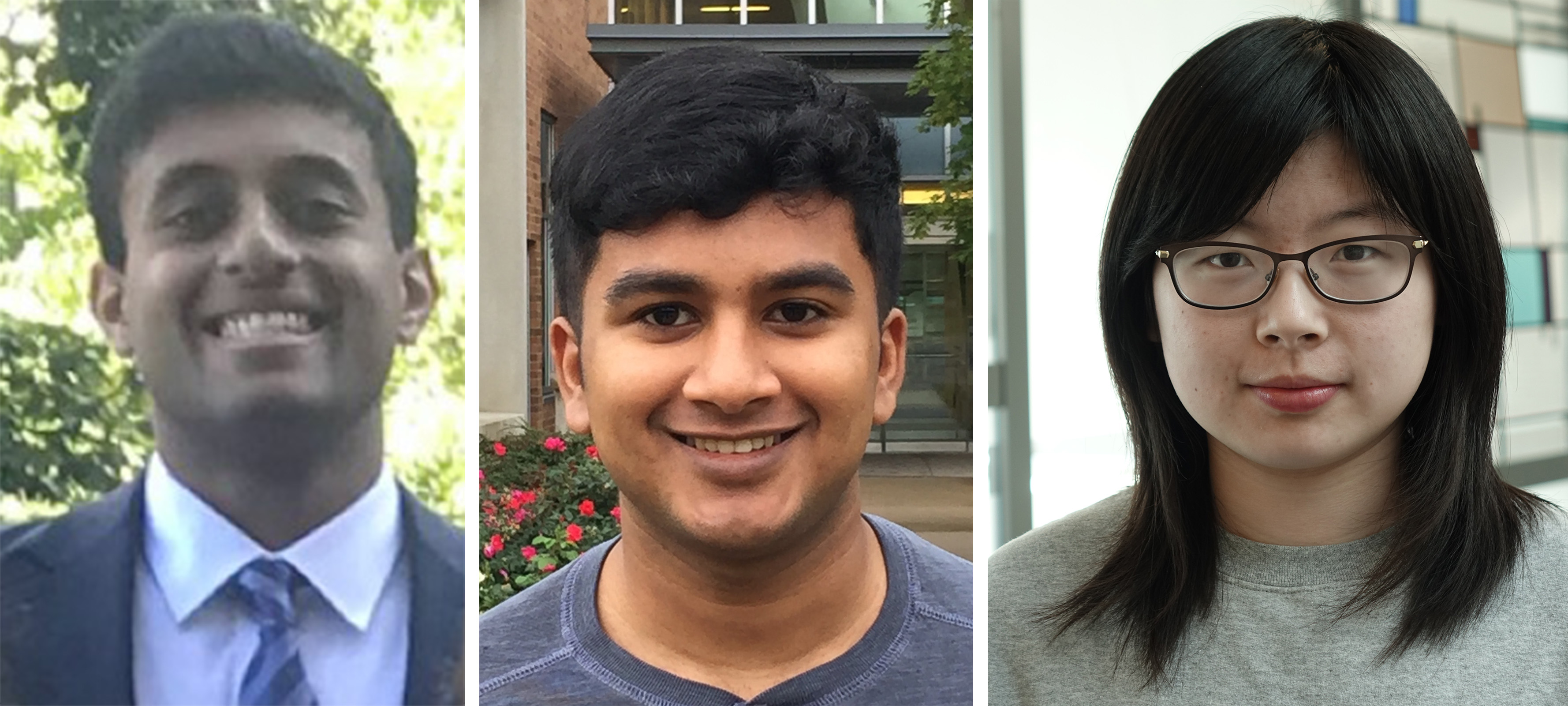CRA recognizes three outstanding undergraduate researchers
The three students were given Honorable Mentions for their interdisciplinary projects.

 Enlarge
Enlarge
Three CSE undergraduates were recognized with Outstanding Undergraduate Researcher Award Honorable Mentions by the Computing Research Association. The students worked across multiple departments on interdisciplinary projects exploring natural language processing, algorithm design, and database design. The program recognizes undergraduate students in North American colleges and universities who show outstanding potential in an area of computing research.
Vinayak Ahluwalia
Ahluwalia’s research is entitled “Policy-Based Branch-and-Bound for Multi-Model Markov Decision Processes.” He worked with Dr. Lauren Steimle and Dr. Brian Denton in the Industrial and Operations Engineering to develop a new algorithm for solving large decision-making problems when the parameters are uncertain.
“My algorithm significantly outperforms the current state-of-the-art mixed-integer programming (MIP) formulation and we have used to it solve several case studies,” Ahluwalia says. Their applications included the initiation of HIV therapy and machine repair problems. The team has a paper under review and another in preparation. Ahluwalia was able to travel to Phoenix in 2018 and Seattle in 2019 to present his work.
His general research interests lie in the intersection of healthcare and artificial intelligence, mainly through machine learning and computer vision.
Sayan Ghosh
Ghosh submitted two projects for consideration, both covering his work on code-switching and cultural diffusion and working with Prof. David Jurgens in the School of Information.
In one study Ghosh explored the sociolinguistic factors surrounding code-switching between Naijá (also known as Nigerian Pidgin) and English in online discussions. He and his co-authors built a massive dataset of articles and corresponding comment sections from some of the largest Nigerian newspapers, and then quantified and measured several factors that may influence when people switch between the two languages. This project was a collaboration with Innocent Ndubuisi-Obi.
His other project, which is still ongoing, investigates the influence that bilingual individuals have on the diffusion of information between disparate language communities. In particular, the team is looking at a massive Twitter dataset and trying to measure the causal influence that proximity to a bilingual “bridge” has on whether certain pieces of information flow across language communities.
Ghosh’s general research interests are mostly in NLP (Natural Language Processing)/Computational Linguistics.
“I am interested in studying how humans use language,” he says, “whether this involves studying formal models of pragmatics (the study of language in use) or studying real-world social networks and seeing how their structure interacts with the specific types of language used by its members.”
Xinyi Zheng
Zheng’s worked with Professor H.V. Jagadish and CSE alum Nikita Bhutani on her research project, titled “Query Heterogeneous (Semi-)Structured Knowledge Sources.”
Through a literature review, Zheng found that existing techniques only considered simple queries without join operations. To fill the gap, she proposed targeting complex, compositional natural language queries towards knowledge bases.
“Jag and Nikita encouraged me to pursue that direction,” says Zheng. A key challenge is how to bridge the gap between natural language expressions and the complex schema of knowledge bases. While the Natural Language Processing community uses neural relation extraction, the Data Management community uses template matching.
So, Zheng proposed a combination of the two to address the research question. The team developed a general paradigm – decompose-execute-join for complex, compositional queries. Zheng worked for a whole year on the project, and was co-first author on two resulting papers.
“Along the way I learned a lot about state-the-of-the art in NLP (especially IE) and Graph Databases, and developed a strong interest in the combination of Data Management and Machine learning,” she says.
Zheng’s research interests lie in the broad data science field. More specifically, she is interested in time-evolving data and semantically rich graph data, or a combination of the two.
“I am fascinated by developing scalable methods for big data that make intuition mathematically principled,” she says. “I am honored to win the award. It cannot be made without the support from our department, the research opportunity given, mentorship from Ph.D. students and advice from professors.”
 MENU
MENU 
